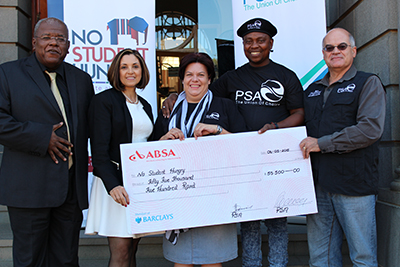Latest News Archive
Please select Category, Year, and then Month to display items
12 January 2024
|
Story Nonsindiswe Qwabe
|
Photo Sonia Small
 Since joining the UFS in 2008, Dr Grey Magaiza has worked extensively on approaches that can foster the socio-economic transformation of societies.
Since joining the UFS in 2008, Dr Grey Magaiza has worked extensively on approaches that can foster the socio-economic transformation of societies.
“The future should be one where communities can decide on their development agenda and futures. That’s the most important for me.” Dr Grey Magaiza, Deputy Director of the Centre for Gender and Africa Studies (CGAS) and Head of the Community Development programme on the Qwaqwa Campus, is passionate about capacitating communities to be agents of change and advancement. His vision for the future emphasises the empowerment of communities to take charge of their development by actively participating in decision making and the implementation of development projects that can improve their lives.
Since joining the UFS in 2008, Dr Magaiza has worked extensively on approaches that can foster the socio-economic transformation of societies. Over the years, he has crafted his research speciality into one that he is most proud of – being an interdisciplinary scientist immersed in the development of communities.
“I’m in a fortunate position of researching what I like. I say ‘fortunate’, because I’ve taken the time to understand what I’m passionate about, which is the overall field of rural livelihoods and livelihood futures – in short, community development. My research starts from an engaged university, understanding the elements that a university must use to enhance transformation and relevance to its immediate community in terms of development.”
One of the ways he has done this is by looking at social entrepreneurship as a development approach for young people in a rural setting. Through workshops with non-profit and civic organisations in Qwaqwa, Dr Magaiza has been helping these organisations to map out their needs and actively meet them through the involvement and support of external role players.
“We understand that communities are part of the national development agenda, but even that national agenda respects community knowledge and intentions and allows communities to shape their identity. A critical enabler of this is community organising. You bring back the capacity in communities to have dialogues on issues affecting them as spaces for engagement, knowledge exchange, and for people to just talk about their way forward.”
By enabling communities to define their development agenda, they can address their specific needs, challenges, and aspirations, he said. “When I look at livelihood futures, it’s quite an exciting aspect of my work – it’s like looking into a fortune tellers’ globe, because you’re not deciding for communities what they should do, but the communities themselves take those decisions.”
No Student Hungry Programme presented with a generous donation
2015-05-18

From Left: Prof Jonathan Jansen, UFS Vice-Chancellor and Rector, Mrs Grace Jansen, Custodian of the NSH, Ms Lynsie Pelser, PSA Free State Social Responsibility Chairperson, Dr Vuyo Dyantyi, PSA President, and Mr Gerhard Koorts, PSA Provincial Manager. |
The Public Servants Association of South Africa (PSA) presented a cheque for R55 500 to the No Student Hungry Programme on 7 May 2015 at the UFS Bloemfontein Campus. The PSA has been a proud supporter of NSH, and of initiatives such as the NSH 1000/33 Stride that saw four volunteers walk from Bloemfontein to Cape Town to raise funds for the programme from the send-off on 1 May 2014 to the welcoming on 3 June 2014 in Cape Town.
On receiving the cheque, Prof Jonathan Jansen, Vice-Chancellor and Rector of the UFS, expressed his gratitude on behalf of the university and all the students who stand to benefit from this initiative.
As a politically non-affiliated union, the PSA’s main focus is labour development and community support throughout the Free State and nationally. The NSH has received a total of R165 000, donated by the union since 2014, which supports more than 25 students.
The President of the PSA, Dr Vuyo Dyantyi, said “Our motto is to invest in human potential, and in programmes that will give the future generation a chance to prosper.”
The No Student Hungry Programme supports more than 130 students each year with daily meals, mentorship, and support on all three campuses.